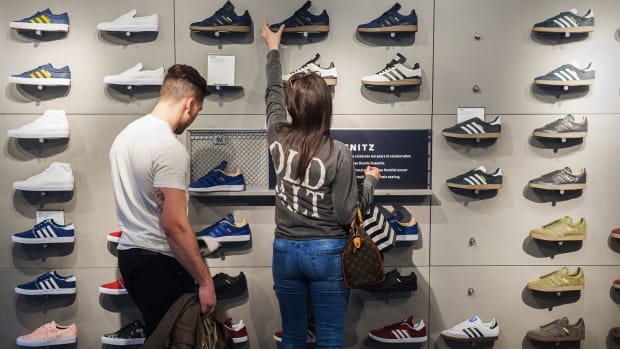
Shoe businesses have been in the news a lot recently beginning with the fallout from the deal with Ye, aka Kanye West and Adidas (ADDYY) after the rapper/actor's anti-Semitic comments sent shock waves through his fan base. Adidas was forced to pull the deal as the “right” move, despite the financial crunch it would cause.
Amazon Studio launched (AMZN) movie “Air: Courting a Legend” featuring the story behind Nike (NKE) developing a shoe line entirely around Michael Jordan. However, this news puts the shoe companies in the spotlight for an entirely different reason, bankruptcy.
There are different kinds of bankruptcy and businesses can even move on after filing for bankruptcy and rebuild the business. Chapter 7 bankruptcy is filed when the assets of a company are liquidated, and the net proceeds are then disbursed to pay back the company's debts and the company is dissolved.
Chapter 11 bankruptcy is filed when a company sees a possibility of survival after restructuring its debts or in a sale of its assets. The company works with a trustee to work to create a sustainable plan and ability to partially repay its debts. In some cases, liquidation occurs in Chapter 11.
Another sneaker chain recently went bankrupt in 2022, Olympia Sports, Inc. that did business as Olympia Footwear out of Pennsylvania. It filed for Chapter 11 bankruptcy and began to liquidate its stores and assets. Olympia Sports stated that filing the bankruptcy was necessary in order to fulfill its obligations to its employees and remaining customers through its liquidation process, which took months to complete.

Shutterstock
Major Shoe Brands Left Holding the Bill
Shoe City began its operations 74 years ago as Eileen Shoes, as a family-owned business, and remained family owned for its duration. Eileen Shoes rebranded the company to Shoe City in 1980. After years of business, the Baltimore-based shoe chain found itself struggling to get the same level of sneaker releases and high-end products, according to Retail Dive, which are necessary for the shoe retail business. The company started to fall into debt without the necessary shoes to sell.
Shoe City is now meeting the same demise as Olympia Sports. After struggling to regain its 'footing' during the pandemic, the company was in the red by $280,000 in fiscal year 2020, which wasn’t a terrible place to be, especially during the pandemic. Even in the red, Arklyz Group out of Switzerland which owns competitor, The Athlete’s Foot was in talks with the shoe chain to acquire the company, but the deal fell through.
However, in the end, it did not get any better for Shoe City, and the company dipped even further into the red, Retail Dive reported. Restructuring attempts to regain profitability have all failed.
Shoe City filed for Chapter 11 protection on March 31 in the U.S. Bankruptcy Court for the District of Maryland.
“Unfortunately, after 74 years in business, the Shoe City legacy has come to an end,” Stanley Mastil, Shoe City's chief restructuring officer, said when discussing Shoe City filing Chapter 11 bankruptcy, citing that it had no viable future to continue its business operations.
The vendor credit list of shoe brands affected by the bankruptcy is a list of pretty high-end shoes with debts over $1 million to some. The popular shoe chain has outstanding debts that will leave the shoe companies themselves holding the bill. Shoe brands owed debt include New Balance, $1.6 million; Timberland (VFC), $1.4 million; Puma, $1.35 million; and Nike, $665,000. The other creditors in the Shoe City bankruptcy include Under Armour (UAA), Adidas, Fila (FILAF) , Asics (ASCCF) , and Reebok. These amounts could have been much higher, but some vendors started requiring payment before the products would be shipped to Shoe City.
Shoe City's Next Move
Shoe City will liquidate its assets to generate income from the shoe inventory to pay its creditors, the quickest way to end the company's operations, according to Gordan Brothers, who is facilitating the liquidation. The shoes and apparel are going to be priced at 30% off to start to move inventory out the door.
However, one thing that may be quite valuable is the commercial leases and real estate that Shoe City has had and maintained for its 70+ years in business. Shoe City currently has 39 stores in Virginia, Maryland and Washington, D.C. The retail spaces ranging from 2,000 square feet to 9,900 square feet and will be available for other businesses that are looking to grow and expand. In the bankruptcy filing, Shoe City has an estimated $10 million to $50 million in assets, but it also has an estimated $10 million to $50 million in debt as well.







